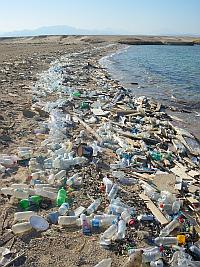 Last week, representatives from 175 nations agreed to begin writing a global treaty that would restrict the explosive growth of plastic pollution on land and sea. The agreement commits nations to work on a broad and legally binding treaty that would not only aim to improve recycling and clean up the world’s plastic waste, but would also include curbs on plastics production itself.
Last week, representatives from 175 nations agreed to begin writing a global treaty that would restrict the explosive growth of plastic pollution on land and sea. The agreement commits nations to work on a broad and legally binding treaty that would not only aim to improve recycling and clean up the world’s plastic waste, but would also include curbs on plastics production itself.
World leaders have until 2024 to agree on the terms of the plastic pollution treaty, including which elements will be legally binding and how the deal will be financed.
Scientists say plastics cause harm throughout their life cycle, releasing toxic as well as planet-warming greenhouse gases during production, landfill and incineration. Plastics, which are manufactured from fossil fuels, caused 4.5 percent of global greenhouse gas emissions in 2015, one recent study estimated, more than all of the world’s airplanes combined.
The International Union for Conservation of Nature (IUCN) notes that:
- Over 300 million tons of plastic are produced every year for use in a wide variety of applications.
- At least 14 million tons of plastic end up in the ocean every year, and plastic makes up 80% of all marine debris found from surface waters to deep-sea sediments.
- Marine species ingest or are entangled by plastic debris, which causes severe injuries and death.
- Plastic pollution threatens food safety and quality, human health, coastal tourism, and contributes to climate change.
Thanks to Virginia Jones for contributing to this post.

Thanks. So many tell of the volume, risk to native species and collections in human bodies, but so few care enough to stop using. How do we get humans to work together to stop or decrease use of plastics. When in the Graduate movie the concept that the future was plastics. Now essential.how can we transfer to biodegradable materials?